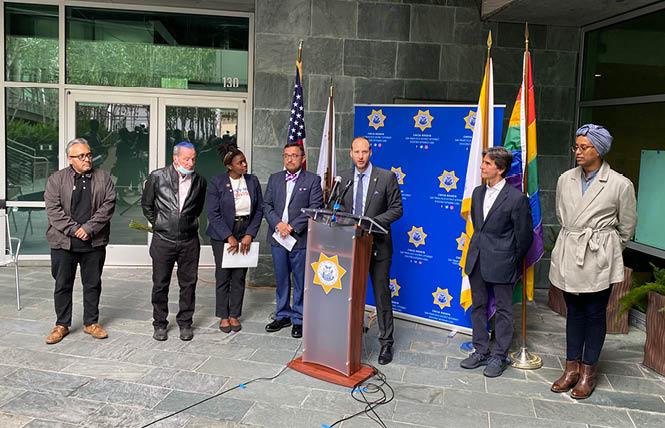Staff at the San Francisco District Attorney’s office will be required to ask, and then use, the correct names, pronouns, and titles for transgender and nonbinary crime victims, witnesses, and the accused, according to a new policy announced June 30.
The policy, effective Wednesday, will also allow charging documents to be amended to use their preferred names if the person accused of a crime requests it, though “legal names will also continue to be listed secondarily on all charging documents for the purposes of criminal record-keeping.”
At an afternoon news conference — held after a Pride party at District Attorney Chesa Boudin’s office in the Potrero Hill neighborhood — the city’s chief law enforcement officer said that it is the first policy of its kind in any California prosecutor’s office.
The San Jose Police Department instituted a similar policy earlier this year, as the Bay Area Reporter previously reported. The San Francisco Police Department’s policy differs from that of its South Bay neighbor in that legal names are used in its legal documents and police reports.
Boudin’s Chief of Staff David Campos, a gay man, said he hopes that the office’s new name and pronoun policy sends a message not only to other district attorneys but also “to other entities in the county of San Francisco, who hopefully will take steps in embracing this policy.”
The San Francisco Police Department and the San Francisco Sheriff’s Department did not respond to immediate requests for comment.
In 2018, San Francisco Mayor London Breed ordered all city agencies and departments that collect demographic data to update their forms, both paper and electronic, so that they include the option of nonbinary in addition to male and female when asking about gender identity. The mayoral directive also ordered that the forms expand on title options beyond Mr. and Ms. and include additional choices for pronouns other than just she/her/hers and he/him/his. The forms had to also include a line for a person’s preferred name and use gender-neutral labels such as “parent/guardian” instead of “father” and “mother.”
Boudin was joined by several local LGBTQ leaders including Campos, a former city supervisor and immediate past chair of the San Francisco Democratic Party; Honey Mahogany, a queer nonbinary trans person who is the current party chair and an aide to District 6 Supervisor Matt Haney; Tom Ammiano, a gay man who is a former supervisor and assemblyman; Mark Leno, a gay man who is a former supervisor, assemblyman, and state senator; and Kaylah Williams, a bisexual woman who is the co-president of the Harvey Milk LGBTQ Democratic Club.
“Pride is such a pivotal part of who we are as a city,” Boudin said. “There’s a long, often-shameful history with law enforcement interacting with the community we celebrate today.”
Boudin said the new policy will help hasten the end of that history, and cited data from the Los Angeles-based Trevor Project showing that trans and nonbinary youth who are referred to by their correct pronouns have a 50% less chance of attempting suicide compared with those whose pronouns were not respected.
“It is critical that transgender people feel safe, whether accused of a crime or the victim of a crime,” Boudin said.
Boudin extended a warm thank you to Rachel Marshall, his director of communications and policy advisor, “for her leadership and innovation on this policy.”
Second such policy in the U.S.
This is the second policy of its kind in the United States, Boudin said. The first was implemented in Washtenaw County, Michigan, home of the city of Ann Arbor. Staff there under Prosecutor Eli Savit helped Boudin’s office with the policy.
Boudin’s office also received the assistance of the Transgender Law Center, the National Center for Lesbian Rights and the San Francisco Office of Transgender Initiatives.
“Transgender Law Center is encouraged to see proactive change from the district attorney’s office, as it’s one of many steps that can be taken to better meet the needs of transgender people who historically are criminalized at high rates simply for being transgender and surviving,” Shelby Chestnut, a trans and queer person who is the director of policy and programs for the Transgender Law Center, stated in a news release.
Imani Rupert-Gordon, a queer woman who is the executive director of the National Center for Lesbian Rights, contrasted the new policy with measures being taken in other states that are taking away rights from trans people.
“Every person who comes in contact with the criminal justice system must be treated with dignity and respect,” Rupert-Gordon stated. “Given the epidemic of violence against transgender women of color, policies by government officials that protect transgender people are more urgent than ever. NCLR supports District Attorney Boudin in implementing these common sense protections for transgender and non-binary people who interact with the district attorney’s office.”
As a matter of fact, the B.A.R. reported on June 28 that the California Attorney General Rob Bonta announced the Golden State has added five states to its banned travel list for passing anti-LGBTQ laws since 2015, bringing the total number of states on the list to 17.
Bonta also announced earlier on June 30 the release of a report showing reported anti-trans hate crimes rose 72% in 2020.
Clair Farley, a trans woman who is the executive director of the city’s Office of Transgender Initiatives, said the administrative office is proud to have helped out in crafting the DA’s new policy.
“We are proud to have consulted with the San Francisco District Attorney’s office in drafting this new Gender Inclusion Policy that expands the use of chosen names and pronouns,” Farley stated. “Trans and gender-nonconforming communities — specifically Black trans women — experience disproportionate rates of violence and engagement with the criminal justice system, and this new policy takes important steps in assuring trans residents are respected and feel safe.”
Mahogany said at the news conference that there is still more to be done.
“It’s so incredible how far we’ve come, especially in San Francisco, where we are actually working toward justice for all people,” Mahogany said. “But there’s a part of me so sad it has taken this long, and that it’s the first policy of its kind in California.”
Campos said that it reminded him of Ammiano’s and Leno’s fight on behalf of trans rights in the Legislature. Ammiano recounted the two working on Assembly Bill 1266, which in 2013 extended gender identity protections to public school students.
He said anti-trans forces fought against it tooth-and-nail, and even some in the LGBTQ community thought it was a back-burner issue.
“We come from San Francisco,” Ammiano said. “Don’t mess with us. We know what blood sport is.”
When an aide to then-Governor Jerry Brown came to the floor of the Assembly to speak with Ammiano, he got nervous.
“We didn’t know if the governor was going to support it or not,” Ammiano said. “I thought ‘Oh shit, I’m in trouble now.’ But he [the aide] let me know that the governor would sign it. It showed us what could be done.”
Leno called the new policy “constitutionally required.” His successor in the state Senate, Scott Wiener, issued a positive statement in a news release.
“At a time where LGBTQ rights — particularly rights for trans people — are under attack across the country, it’s critical that we, in San Francisco, lead on LGBTQ civil rights,” Wiener stated. “This starts with the very basics: respecting people’s gender identity. I applaud District Attorney Boudin’s commitment to this goal in our courts; we must ensure people’s pronouns and names are respected in every circumstance, including when they come through our legal system.”
Help keep the Bay Area Reporter going in these tough times. To support local, independent, LGBTQ journalism, consider becoming a BAR member.







